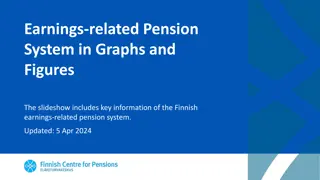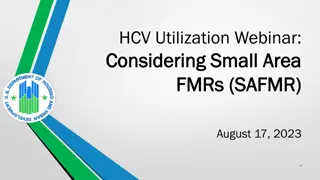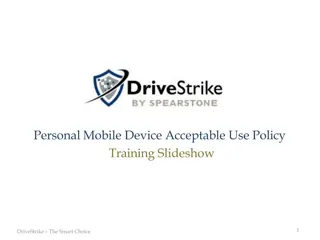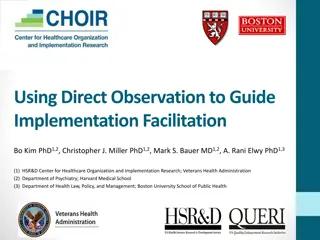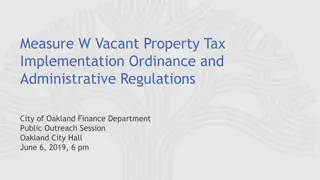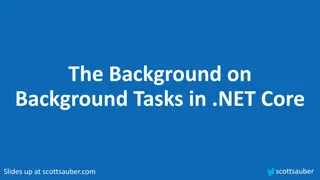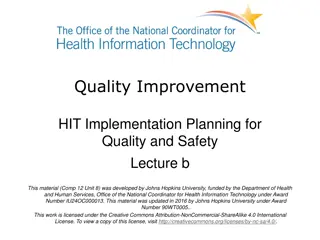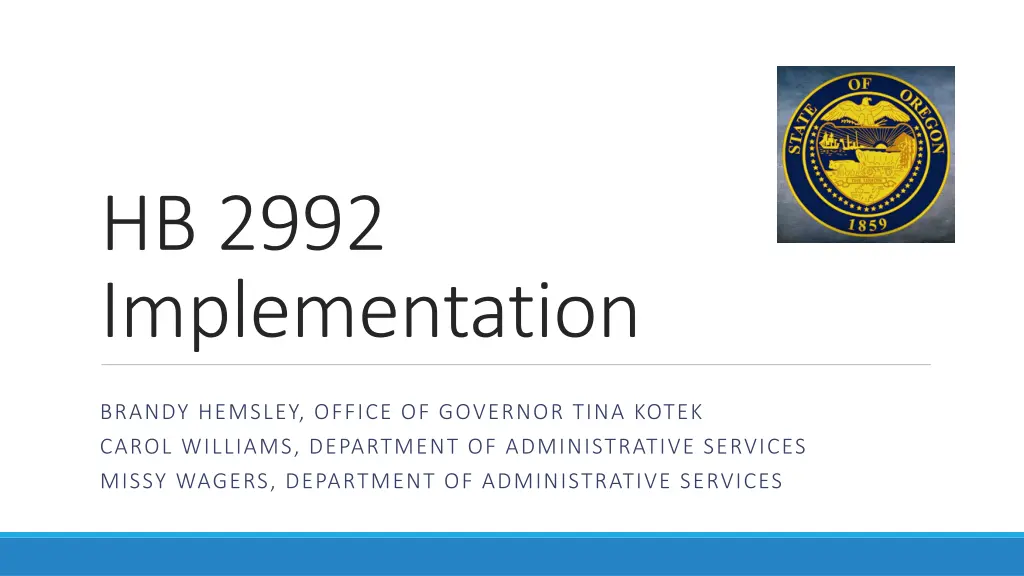
Understanding HB 2992 Implementation for Board and Commission Compensation
Explore the details of House Bill 2992 that went into effect in October 2021, aiming to promote equity and enhance public participation by adjusting compensation for board and commission members based on their eligibility. Learn about the self-attestation process, determining member eligibility, and the impact on taxable income for qualified members.
Download Presentation

Please find below an Image/Link to download the presentation.
The content on the website is provided AS IS for your information and personal use only. It may not be sold, licensed, or shared on other websites without obtaining consent from the author. If you encounter any issues during the download, it is possible that the publisher has removed the file from their server.
You are allowed to download the files provided on this website for personal or commercial use, subject to the condition that they are used lawfully. All files are the property of their respective owners.
The content on the website is provided AS IS for your information and personal use only. It may not be sold, licensed, or shared on other websites without obtaining consent from the author.
E N D
Presentation Transcript
HB 2992 Implementation BRANDY HEMSLEY, OFFICE OF GOVERNOR TINA KOTEK CAROL WILLIAMS, DEPARTMENT OF ADMINISTRATIVE SERVICES MISSY WAGERS, DEPARTMENT OF ADMINISTRATIVE SERVICES
Went into effect in October 2021 Intended to promote equity & remove barriers to public participation House Bill 2992 (2021) Made changes to ORS 292.495, which authorizes certain board and commission members to receive compensation and expense reimbursement for performance of official duties Increased the amount of compensation paid Made changes to who qualified for those payments
Type of Board or Commission Non-Qualified Members Qualified Members Determining Eligibility by Board Type Formed by specific statute Eligible for per diem compensation when another statute besides ORS 292.495 specifically authorizes it. Eligible for per diem compensation and reimbursement of expenses Eligible for reimbursement of expenses within limits provided by law unless another statute prohibits reimbursement Formed by agency head under statue delegating authority to help agency carry out legislatively mandated program Eligible for per diem compensation when another statute besides ORS 292.495 specifically authorizes it. Eligible for per diem compensation and reimbursement of expenses Eligible for reimbursement of expenses within limits provided by law unless another statute prohibits reimbursement Formed by agency head under agency s general enabling statutes to help agency carry out legislatively mandated program Not eligible for per diem compensation. Eligible for per diem compensation and reimbursement of expenses Eligible for reimbursement of expenses within limits provided by law unless another statute prohibits reimbursement
Members complete a self-attestation form and identify themselves as a qualified member, a non-qualified member. Members may also indicate that they are declining compensation Determining Eligibility of Individual Members To receive compensation, a member: Must not be in full-time public service and Must be either: A qualified member, or A non-qualified member authorized by law to receive compensation, subject to availability of funds
Qualified members are those with an adjusted gross income in the previous tax year of less than $50,000, or less than $100,000 as reported on a joint return Compensation received may be considered taxable income and may impact a member s eligibility for various benefit programs. Any member may choose to decline compensation. Qualified members
Non-qualified members may still receive compensation if authorized by law. There must be another law, outside of ORS 292.495, that authorizes non-qualified members to receive per-diem compensation Non-Qualified Members Example: ORS 689.115(4) Members of the board are entitled to compensation and expenses as provided in ORS 292.495. The board may provide by rule for compensation to board members for the performance of official duties at a rate that is greater than the rate provided in ORS 292.495.
Qualified members are entitled to compensation equal to the per diem paid to members of the State Legislature Total amount as of October 1, 2024 is $178 per day Payments to Qualified Members This amount must be paid to qualified members for each day or portion of a day in which they perform official duties, regardless of budget. Members may choose to decline compensation
Attending official meetings of the board or commission Performing assigned tasks necessary to fulfill responsibilities of the member Performance of Official Duties Performing a task for a minimal amount of time does not qualify for compensation for example, spending 5-10 minutes reading or responding to an email A best practice may include adopting rules, bylaws, or policies to provide guidance on what constitutes official business and the estimated time commitment
Qualified members are also eligible to receive reimbursement for actual and necessary travel or other expenses incurred in the performance of their official duties within the limits established by law and DAS policy. Expense reimbursement Other members unless otherwise provided by law, and whether or not they are eligible for per diem compensation, other members are eligible to receive reimbursement for actual and necessary travel or other expenses incurred in the performance of their official duties within the limits established by law and DAS policy.
Members of statutorily created boards and commissions are considered employees for federal tax purposes and should be entered into Workday as board members. Tax Withholding Requirements
Members of boards and commissions formed by an agency head may or may not be considered employees for federal tax purposes. DAS has developed the following guidelines: Does the body meet on a regular basis? Do members receive orientation, a handbook, charter, bylaws, or similar onboard materials? Does the body anticipate its work will last more than four months, or has the body s work lasted more than four months? Tax Withholding Requirements
If the answer to ALL three questions is no, then the individuals are not entered into Workday and their compensation is reportable on Form 1099-NEC if compensation totals $600 or more during the calendar year. If the answer to ALL three questions is yes, then the individuals are entered into Workday as contingent workers, and their compensation is subject to federal and Oregon tax withholding and FICA taxes. Tax Withholding Requirements If the answer to some questions is yes and others no, the circumstances will be assessed on a case-by-case basis. You may wish to consult DOJ General Counsel for assistance.
Informally recognizing the service of volunteers is separate from the issue of compensation and expense reimbursement as required by ORS 292.495. Agencies sometimes offer gift cards as a token of appreciation for participation in a community discussion, focus group, or similar activity. It is an individual determination of the agency whether a particular body has the authority to expend its budgeted funds for gestures of appreciation. Agencies should be aware of the tax implications of amounts given to an individual exceed $600 in a calendar year. Agencies should consult with their financial office and / or DOJ for further guidance. Volunteers
Boards or commissions established by specific statutory authority delegated to the agency head: This broader category includes councils, task forces, workgroups, advisory groups organized at the direction of an agency head under specific statutory authority granted to the agency head. Important Definitions Boards or commissions established under the agency s general enabling statutes: This broader category includes councils, task forces, workgroups, advisory groups organized at the direction of an agency head more generally under an agency s enabling statutes when the purpose is to carry out a legislatively mandated program. It does not include public meetings with stakeholders or rules advisory committees.
Full-time Public Service: Includes all full-time employment with any public body within the state of Oregon, included but not limited to cities, counties, special districts, school districts, and community colleges. Lucrative Office: A position is a lucrative office if five tests are met: (1) a salary or other compensation beyond expenses is attached to it; (2) the office is created by statute or the constitution; (3) its holder exercises part of the sovereign power of government; (4) in a matter of public concern; and (5) the position is not temporary or intermittent. A person can not serve in more than one lucrative office. Consult DOJ if there are questions about someone serving on more than one body that may be a lucrative office. Important Definitions
Complete at the formation of the body Documentation of how group was formed Information is used to determine if time is compensable and if taxable Group Establishment Form
Eligibility for Compensation
Compensation Tax Withholding Requirements
- Definitions - Volunteer Recognition and Support - FAQ Resources
Those eligible for compensation MUST be compensated and is paid with the agency s budget The creator of the body determines what official duties are Things to Remember Members entered in Workday must take the Discrimination and Harassment Free Workplace training The Compensation Self-Attestation form is completed once a year and is based on the previous tax years income
Those not eligible for compensation under ORS 292.495 will: Things to Remember Receive any renumeration through the state financial system Receive a Form 1099-NEC if they receive $600 or more in a year and the money will be reported to the IRS
Question: Which bodies and members are entered into Workday? Answer: Only those who receive compensation Question: Who enters the members into Workday? Answer: The agency HR designee for: Agency Head under statute delegating authority Agency Head under general enabling statute Workday Question: What if we have members entered in Workday who should not be receiving compensation? Answer: The agency designee will end the appointment in Workday.
New position representations have been created specifically for these Boards, Commissions, and Advisory Groups. Established by Agency Head under statute delegating authority: Position Representation will be BSDA. Workday Established by Agency Head under general enabling statute: Position Representation will be BGES.
If your board or commission already exists within Workday: The positions will need to have multiple updates to correct the organization assignment and the grade profiles. If your board or commission already exists within Workday and has people sitting in positions: The members will need to have multiple updates to correct their organization assignment, grade profile, union membership, and add compensation if they qualify for a stipend. Workday If your board or commission is not currently in Workday: A new supervisory org will need to be created and new positions will need to be created. All of this will need to be completed by your HR Partners. A QRG and knowledge articles are available and will walk them through any updates that are needed.








